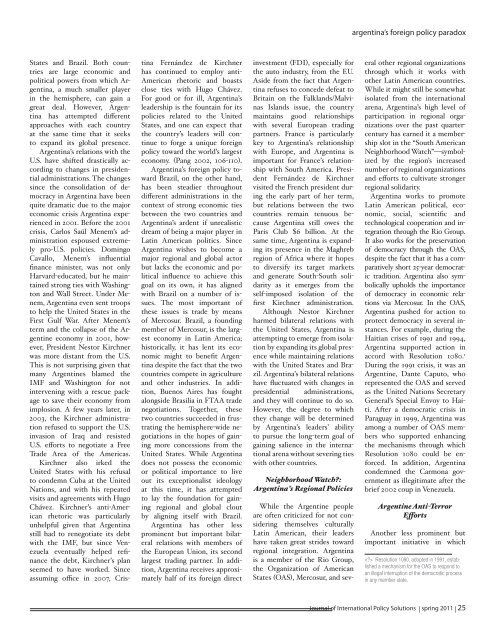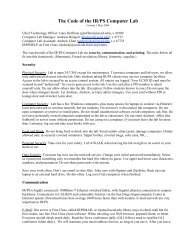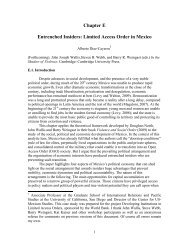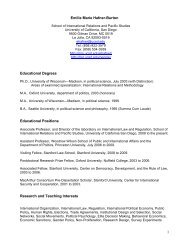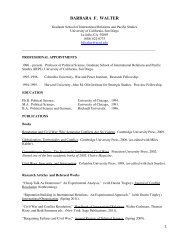to download the full journal. (1.2MB PDF) - School of International ...
to download the full journal. (1.2MB PDF) - School of International ...
to download the full journal. (1.2MB PDF) - School of International ...
Create successful ePaper yourself
Turn your PDF publications into a flip-book with our unique Google optimized e-Paper software.
argentina’s foreign policy paradox<br />
States and Brazil. Both countries<br />
are large economic and<br />
political powers from which Argentina,<br />
a much smaller player<br />
in <strong>the</strong> hemisphere, can gain a<br />
great deal. However, Argentina<br />
has attempted different<br />
approaches with each country<br />
at <strong>the</strong> same time that it seeks<br />
<strong>to</strong> expand its global presence.<br />
Argentina’s relations with <strong>the</strong><br />
U.S. have shifted drastically according<br />
<strong>to</strong> changes in presidential<br />
administrations. The changes<br />
since <strong>the</strong> consolidation <strong>of</strong> democracy<br />
in Argentina have been<br />
quite dramatic due <strong>to</strong> <strong>the</strong> major<br />
economic crisis Argentina experienced<br />
in 2001. Before <strong>the</strong> 2001<br />
crisis, Carlos Saúl Menem’s administration<br />
espoused extremely<br />
pro-U.S. policies. Domingo<br />
Cavallo, Menem’s influential<br />
finance minister, was not only<br />
Harvard-educated, but he maintained<br />
strong ties with Washing<strong>to</strong>n<br />
and Wall Street. Under Menem,<br />
Argentina even sent troops<br />
<strong>to</strong> help <strong>the</strong> United States in <strong>the</strong><br />
First Gulf War. After Menem’s<br />
term and <strong>the</strong> collapse <strong>of</strong> <strong>the</strong> Argentine<br />
economy in 2001, however,<br />
President Nes<strong>to</strong>r Kirchner<br />
was more distant from <strong>the</strong> U.S.<br />
This is not surprising given that<br />
many Argentines blamed <strong>the</strong><br />
IMF and Washing<strong>to</strong>n for not<br />
intervening with a rescue package<br />
<strong>to</strong> save <strong>the</strong>ir economy from<br />
implosion. A few years later, in<br />
2003, <strong>the</strong> Kirchner administration<br />
refused <strong>to</strong> support <strong>the</strong> U.S.<br />
invasion <strong>of</strong> Iraq and resisted<br />
U.S. efforts <strong>to</strong> negotiate a Free<br />
Trade Area <strong>of</strong> <strong>the</strong> Americas.<br />
Kirchner also irked <strong>the</strong><br />
United States with his refusal<br />
<strong>to</strong> condemn Cuba at <strong>the</strong> United<br />
Nations, and with his repeated<br />
visits and agreements with Hugo<br />
Chávez. Kirchner’s anti-American<br />
rhe<strong>to</strong>ric was particularly<br />
unhelpful given that Argentina<br />
still had <strong>to</strong> renegotiate its debt<br />
with <strong>the</strong> IMF, but since Venezuela<br />
eventually helped refinance<br />
<strong>the</strong> debt, Kirchner’s plan<br />
seemed <strong>to</strong> have worked. Since<br />
assuming <strong>of</strong>fice in 2007, Cristina<br />
Fernández de Kirchner<br />
has continued <strong>to</strong> employ anti-<br />
American rhe<strong>to</strong>ric and boasts<br />
close ties with Hugo Chávez.<br />
For good or for ill, Argentina’s<br />
leadership is <strong>the</strong> fountain for its<br />
policies related <strong>to</strong> <strong>the</strong> United<br />
States, and one can expect that<br />
<strong>the</strong> country’s leaders will continue<br />
<strong>to</strong> forge a unique foreign<br />
policy <strong>to</strong>ward <strong>the</strong> world’s largest<br />
economy. (Pang 2002, 106-110).<br />
Argentina’s foreign policy <strong>to</strong>ward<br />
Brazil, on <strong>the</strong> o<strong>the</strong>r hand,<br />
has been steadier throughout<br />
different administrations in <strong>the</strong><br />
context <strong>of</strong> strong economic ties<br />
between <strong>the</strong> two countries and<br />
Argentina’s ardent if unrealistic<br />
dream <strong>of</strong> being a major player in<br />
Latin American politics. Since<br />
Argentina wishes <strong>to</strong> become a<br />
major regional and global ac<strong>to</strong>r<br />
but lacks <strong>the</strong> economic and political<br />
influence <strong>to</strong> achieve this<br />
goal on its own, it has aligned<br />
with Brazil on a number <strong>of</strong> issues.<br />
The most important <strong>of</strong><br />
<strong>the</strong>se issues is trade by means<br />
<strong>of</strong> Mercosur. Brazil, a founding<br />
member <strong>of</strong> Mercosur, is <strong>the</strong> largest<br />
economy in Latin America;<br />
his<strong>to</strong>rically, it has lent its economic<br />
might <strong>to</strong> benefit Argentina<br />
despite <strong>the</strong> fact that <strong>the</strong> two<br />
countries compete in agriculture<br />
and o<strong>the</strong>r industries. In addition,<br />
Buenos Aires has fought<br />
alongside Brasilia in FTAA trade<br />
negotiations. Toge<strong>the</strong>r, <strong>the</strong>se<br />
two countries succeeded in frustrating<br />
<strong>the</strong> hemisphere-wide negotiations<br />
in <strong>the</strong> hopes <strong>of</strong> gaining<br />
more concessions from <strong>the</strong><br />
United States. While Argentina<br />
does not possess <strong>the</strong> economic<br />
or political importance <strong>to</strong> live<br />
out its exceptionalist ideology<br />
at this time, it has attempted<br />
<strong>to</strong> lay <strong>the</strong> foundation for gaining<br />
regional and global clout<br />
by aligning itself with Brazil.<br />
Argentina has o<strong>the</strong>r less<br />
prominent but important bilateral<br />
relations with members <strong>of</strong><br />
<strong>the</strong> European Union, its second<br />
largest trading partner. In addition,<br />
Argentina receives approximately<br />
half <strong>of</strong> its foreign direct<br />
investment (FDI), especially for<br />
<strong>the</strong> au<strong>to</strong> industry, from <strong>the</strong> EU.<br />
Aside from <strong>the</strong> fact that Argentina<br />
refuses <strong>to</strong> concede defeat <strong>to</strong><br />
Britain on <strong>the</strong> Falklands/Malvinas<br />
Islands issue, <strong>the</strong> country<br />
maintains good relationships<br />
with several European trading<br />
partners. France is particularly<br />
key <strong>to</strong> Argentina’s relationship<br />
with Europe, and Argentina is<br />
important for France’s relationship<br />
with South America. President<br />
Fernández de Kirchner<br />
visited <strong>the</strong> French president during<br />
<strong>the</strong> early part <strong>of</strong> her term,<br />
but relations between <strong>the</strong> two<br />
countries remain tenuous because<br />
Argentina still owes <strong>the</strong><br />
Paris Club $6 billion. At <strong>the</strong><br />
same time, Argentina is expanding<br />
its presence in <strong>the</strong> Maghreb<br />
region <strong>of</strong> Africa where it hopes<br />
<strong>to</strong> diversify its target markets<br />
and generate South-South solidarity<br />
as it emerges from <strong>the</strong><br />
self-imposed isolation <strong>of</strong> <strong>the</strong><br />
first Kirchner administration.<br />
Although Nes<strong>to</strong>r Kirchner<br />
harmed bilateral relations with<br />
<strong>the</strong> United States, Argentina is<br />
attempting <strong>to</strong> emerge from isolation<br />
by expanding its global presence<br />
while maintaining relations<br />
with <strong>the</strong> United States and Brazil.<br />
Argentina’s bilateral relations<br />
have fluctuated with changes in<br />
presidential administrations,<br />
and <strong>the</strong>y will continue <strong>to</strong> do so.<br />
However, <strong>the</strong> degree <strong>to</strong> which<br />
<strong>the</strong>y change will be determined<br />
by Argentina’s leaders’ ability<br />
<strong>to</strong> pursue <strong>the</strong> long-term goal <strong>of</strong><br />
gaining salience in <strong>the</strong> international<br />
arena without severing ties<br />
with o<strong>the</strong>r countries.<br />
Neighborhood Watch?:<br />
Argentina’s Regional Policies<br />
While <strong>the</strong> Argentine people<br />
are <strong>of</strong>ten criticized for not considering<br />
<strong>the</strong>mselves culturally<br />
Latin American, <strong>the</strong>ir leaders<br />
have taken great strides <strong>to</strong>ward<br />
regional integration. Argentina<br />
is a member <strong>of</strong> <strong>the</strong> Rio Group,<br />
<strong>the</strong> Organization <strong>of</strong> American<br />
States (OAS), Mercosur, and several<br />
o<strong>the</strong>r regional organizations<br />
through which it works with<br />
o<strong>the</strong>r Latin American countries.<br />
While it might still be somewhat<br />
isolated from <strong>the</strong> international<br />
arena, Argentina’s high level <strong>of</strong><br />
participation in regional organizations<br />
over <strong>the</strong> past quartercentury<br />
has earned it a membership<br />
slot in <strong>the</strong> “South American<br />
Neighborhood Watch”—symbolized<br />
by <strong>the</strong> region’s increased<br />
number <strong>of</strong> regional organizations<br />
and efforts <strong>to</strong> cultivate stronger<br />
regional solidarity.<br />
Argentina works <strong>to</strong> promote<br />
Latin American political, economic,<br />
social, scientific and<br />
technological cooperation and integration<br />
through <strong>the</strong> Rio Group.<br />
It also works for <strong>the</strong> preservation<br />
<strong>of</strong> democracy through <strong>the</strong> OAS,<br />
despite <strong>the</strong> fact that it has a comparatively<br />
short 25-year democratic<br />
tradition. Argentina also symbolically<br />
upholds <strong>the</strong> importance<br />
<strong>of</strong> democracy in economic relations<br />
via Mercosur. In <strong>the</strong> OAS,<br />
Argentina pushed for action <strong>to</strong><br />
protect democracy in several instances.<br />
For example, during <strong>the</strong><br />
Haitian crises <strong>of</strong> 1991 and 1994,<br />
Argentina supported action in<br />
accord with Resolution 1080. 1<br />
During <strong>the</strong> 1991 crisis, it was an<br />
Argentine, Dante Capu<strong>to</strong>, who<br />
represented <strong>the</strong> OAS and served<br />
as <strong>the</strong> United Nations Secretary<br />
General’s Special Envoy <strong>to</strong> Haiti.<br />
After a democratic crisis in<br />
Paraguay in 1999, Argentina was<br />
among a number <strong>of</strong> OAS members<br />
who supported enhancing<br />
<strong>the</strong> mechanisms through which<br />
Resolution 1080 could be enforced.<br />
In addition, Argentina<br />
condemned <strong>the</strong> Carmona government<br />
as illegitimate after <strong>the</strong><br />
brief 2002 coup in Venezuela.<br />
Argentine Anti-Terror<br />
Efforts<br />
Ano<strong>the</strong>r less prominent but<br />
important initiative in which<br />
Resolution 1080, adopted in 1991, established<br />
a mechanism for <strong>the</strong> OAS <strong>to</strong> respond <strong>to</strong><br />
an illegal interruption <strong>of</strong> <strong>the</strong> democratic process<br />
in any member state.<br />
Journal <strong>of</strong> <strong>International</strong> Policy Solutions | spring 2011 | 25


